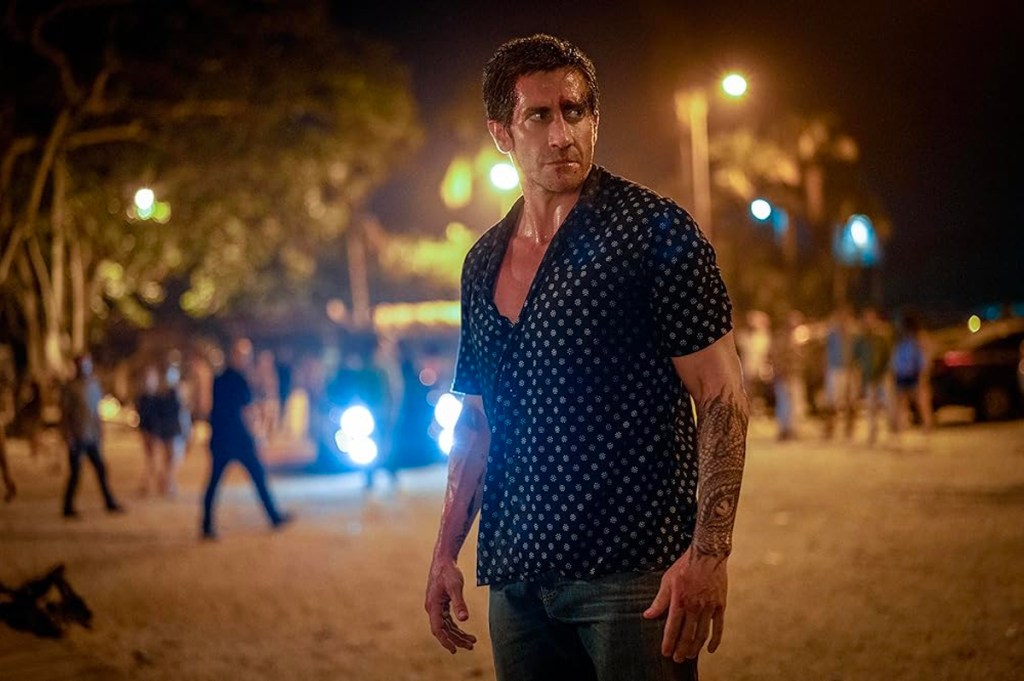There is a magical nexus between awful and amazing on which some movies land. Sometimes it is a self-aware reach toward the awful that creates the magic, other times it is the filmmaker’s obliviousness that creates a Bob Ross happy accident that delights viewers and creates a cult classic. Amazon’s Road House is not such a movie.
The 2024 film, loosely based on 1989’s Road House, mostly adheres to the Wikipedia plot summary of the Patrick Swayze classic, if you forgive them for forgetting to make the plot discernible. Jake Gyllenhaal is a former UFC fighter, rather than a professional bouncer, in this iteration. He is recruited to become a bouncer for a club experiencing a wave of violence, as was the case in the original. He is a badass, as Swayze was. There is a love interest, of sorts, named Ellie.
Beyond that, however, it’s just actors on the screen doing things for inexplicable reasons for a majority of the two-hour runtime. Why is the Road House, as the bar in the film is named, under attack? Why is Gyllenhaal’s Dalton so tormented? Why is his love interest pursuing him? Who is the antagonist and what are his aims? What secrets is Frankie, the Road House’s owner, hiding?
For answers to those questions, refer back to the Wikipedia plot summary of the original film, a movie which answered those questions along the way to providing action, fighting, romance and character arcs on the way to giving viewers one of the greatest lines in the history of cinema. It is a line that should have been used and its omission speaks to the lack of seriousness with which the filmmakers approached this production.
The line to which I’m referring, of course, is “I used to fuck guys like you in prison.” Meant to be a dig at Dalton, it was instead a preface to an ass-kicking of epic proportions that ended with Dalton ripping his opponent’s throat out. To not include it is a sin of such magnitude as to be akin to remaking Gone with the Wind without “Frankly, my dear, I don’t give a damn” or A Christmas Story without “You’ll shoot your eye out!”
Proclaiming that omission should relegate the writers and director of Road House to a distant hinterland from which they will never again be able to inflict their artistic insensibilities upon viewers is to put things too mildly, though that ignores the aforementioned lack of discernible plot, romance and character arcs, even if there is a fair amount of fighting.
Gyllenhaal beefed up for the role, at least from the waist up. That he is clad in jeans for the entirety of the film suggests leg day was not part of his preparation to play Dalton. The choreography for the fights, though, is excellent. He waylays myriad ruffians. He gets roughed up by the cops. He battles Conor McGregor numerous times, including during the climax of the movie. That McGregor portrays a rough character with connections to prison inmates only magnifies the absence of the money line from the original.
Beyond those fights, though, there is nothing there, no happy accident of filmmaking. There are hints of substance, but they go unexplored. Are there drug dealers? Is Frankie involved in drug trafficking? Does Dalton have explosive anger issues? Will he and Ellie find peace and settle down together?
The filmmakers forgot to cut the potential drug trafficking angle, so that’s a maybe. Frankie has no big secrets to hide and turns out to merely be a MacGuffin. Dalton does have explosive anger issues, but the writers apparently got distracted and forgot to stick with those. And, because happy endings aren’t cool these days, Dalton and Ellie do not end up together. They don’t even really say goodbye. They simply mysteriously drift in different directions, much as they mysteriously drifted together and then, the movie is over.
Well, it’s over save for the credits, which are truly the highlight of the whole ordeal. They are the Cliff Notes version of the film, distilling the entirety of the movie — plus a few cut scenes that were inadvertently left in — into a few fairly enjoyable minutes. For that, we have to thank the team behind Road House. They may have made a craptastic reimagining of one of the great movies of the 1980s, but at least they went straight to streaming where viewers have the option to only watch the credits instead of wasting their time on the hour and fifty-five minutes that precedes them.












